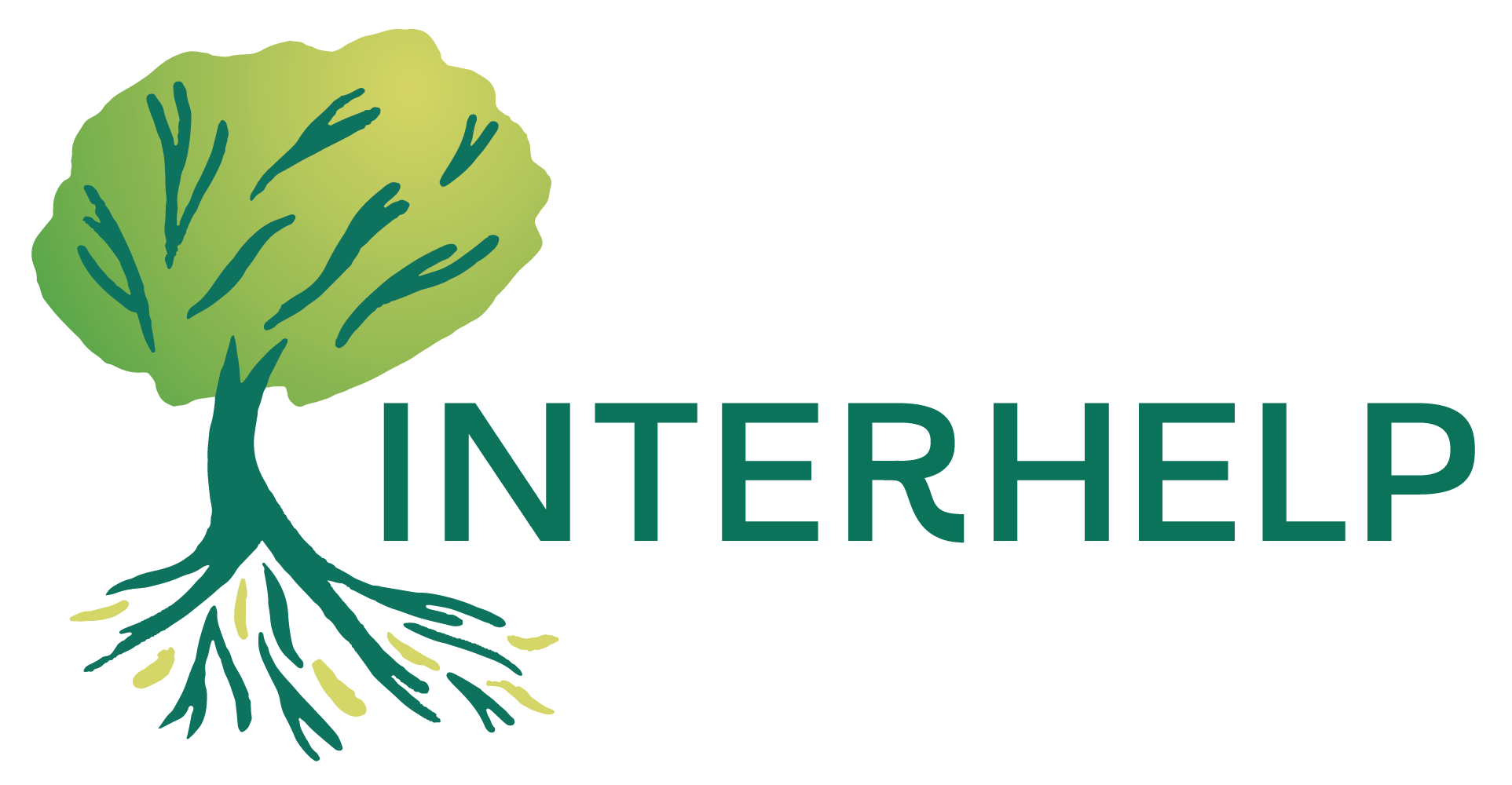We are thrilled that a sixth Earth Leadership Cohort will be convening this fall! We have room for up to 3 more people and will continue accepting late applications into August. Read the full program description to access the application form.
We have received a phenomenal group of applicants, and about half of them would be unable to participate without some financial assistance. Individual requests ranged from $300-$900 and the cumulative need is $5,700. We have raised $2,068 to date.
Please help us support this upcoming cohort by making a generous tax-deductible donation to the ELC VI financial assistance fund.
You can donate online, or by check. Checks should be made out to “Interhelp,” with ELC assistance fund written in the memo line and mailed to:
Interhelp
157 Common Street
Watertown, MA 02472
About the Earth Leadership Cohort
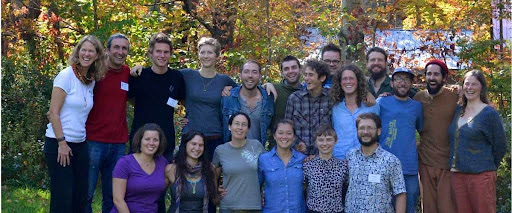
Inaugural Earth Leadership Cohort, 2014
The Earth Leadership Cohort (ELC) is a program designed to support emerging adults (in their 20s and early 30s) in their leadership in a time of great ecological and social challenge. ELC is an immersion experience filled with community, theory, and practices that facilitate the being, doing and living during this time of awesome “response-ability.”
The world needs our deep leadership to evolve a more life-affirming relationship with the entire community of life. What the world looks like for current and future generations of all species depends in great measure on what is done within the next decade to shift the current trajectory of catastrophic ecological and social collapse. These crises stem, in large part, from the ways some human cultures see and relate with the world and all living beings in an hierarchical and extractive way.
Since 2014, there have been five ELC programs with over 50 alumni. While the format for each cohort has varied, a common factor has been meeting over time over the course for two or three in-person retreats. For every cohort, one of the retreats has involved attendance at an intergenerational workshop and a capstone retreat just for cohort members. The connections cohort members form among themselves, with the facilitation team, and with alumni from all cohorts have been an enduring support for many participants.
The primary modality that the Earth Leadership Cohort draws upon is the Work That Reconnects (WTR), known worldwide for helping to renew and empower activists and changemakers in social and ecological justice. Developed by Joanna Macy and colleagues, this dynamic, interactive body of work has inspired many thousands of people worldwide to engage wholeheartedly in a transition, a “Great Turning” as Joanna calls it, to a life-sustaining society.
ELC introduces participants to the theory and practice of the WTR. Described in the book, Coming Back to Life (Macy & Brown, 2014), it brings a new way of seeing the world, as our larger living body, freeing us from the assumptions and attitudes that now threaten all life on earth. The Work That Reconnects has historically drawn on three main wells: deep ecology, systems thinking, and engaged Buddhism. Originally called Despair and Empowerment Work, it invites us to befriend our feelings of pain for what is happening, and from there build strength and resilience for these times of deepening crisis.
The Work That Reconnects always follows a spiral, beginning with grounding ourselves in gratitude for the gifts and miracles of life itself. From this resourced place, we turn together to face and acknowledge the pains of this world. There are so few places in dominant society where we can honestly bring the depths of our grief, our outrage, our terror, and our overwhelm at what is happening on and to this beloved planet and each other as humans. Being honest and authentic with our heartache and outrage for this world often opens us to our interconnectedness, to fresh insights, and to ways of perceiving and being in the world that help us to discover and strengthen our unique contributions.
A growing edge for the Work That Reconnects is to deepen its collective liberation foundations and approaches. The Earth Leadership Cohort fully embraces this evolution, and its facilitators have been leaders in expanding this evolving edge of the work. In ELC, how we are together is an important part of what we do as we lean in towards greater equity, belonging and inclusion.
Other modalities and influences that deeply shape the ELC curriculum include ecopsychology, trauma theory, neuroscience, contemplative and council practices, and the importance of play.
Interhelp has supported the Earth Leadership Cohort through housing its program materials on the Interhelp website and fundraising for a scholarship fund so that the cost is not a barrier to anyone who is accepted to the program. ELC applicants submit an application and go through an interview process before being admitted to the program.
Origins, History & Evolution of the Earth Leadership Cohort
Kirstin Edelglass had the visionary idea to create the Earth Leadership Cohort to provide an opportunity for young adults to experience the Work That Reconnects. In 2014, when Joanna Macy was still traveling to Massachusetts to teach and facilitate the Work That Reconnects, Kirsten envisioned bringing a group of young people to experience the work directly with Joanna, and then have a follow-up experience just for the cohort. Knowing that she did not want to do this alone, she reached out to Aravinda Ananda, Joseph Rotella and Markie Babbott to join the co-facilitation team. Kirstin was a part of the facilitation team for the first four cohorts, and Aravinda, Joseph and Markie have been on the team for all five cohorts.
The first cohort, ELC I, launched in the fall of 2014. Of the original 15 participants, only one person identified as a Person of Color. When this participant withdrew after the first meeting, it was a wake-up call for the ELC facilitation team. While the participant’s reasons for withdrawing were numerous, a significant factor was how white dominant the first retreat was, both in terms of demographics – who was in the room, and in terms of culture and content – e.g. one practice (Harvesting the Gifts of the Ancestors) which reflected on ancestral journeys was narrated primarily from the perspective of European descended peoples, and thus the participant felt written out of the Work. Since that first cohort, the Earth Leadership Cohort has been a cauldron of experimentation with expanding the Work That Reconnects to be more welcoming and respectful for all who are in the room, becoming more skillful with how to address oppressive dynamics as they arise in group spaces.
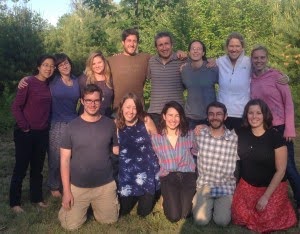
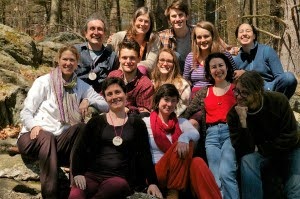
ELC II, 2015 (l) ELC III, April 2016 (r)
In 2018, the facilitation team took a break to reflect, revise and re-vitalize. Aravinda Ananda and Joseph Rotella offered a month-long Regenerative Culture Learning Laboratory.
A fifth cohort, ELC V, convened in fall, 2019.
From 2020-2021 the ELC facilitation team took a break during the height of the Covid-19 Pandemic. During this time, co-facilitators were developing anti-oppressive facilitation approaches and ELC facilitators Aravinda Ananda and Markie Babbott were invited to write a chapter on their work with ELC for the book, Climate Change and Youth Mental Health: Multidisciplinary Perspectives (Elizabeth Haase & Kelsey Hudson Eds., 2024, Cambridge University Press). Their chapter is entitled “Ecological and Intersectional Perspectives to Reduce Young Adults’ Climate Distress: Reflections from a Work That Reconnects Program.”
In the summers of 2022, 2023, and 2024, ELC co-facilitators Joseph, Aravinda and Markie offered a different program called an Interdependence JAM, for a small group of ELC alumni and other Work That Reconnects facilitators to explore anti-oppressive approaches.
Over the years, alumni have organized several reunions and co-facilitated a number of Work That Reconnects workshops for the public. They have also formed an “Earth Leadership Community.”
We are excited to announce that we plan to offer a sixth cohort, ELC VI, in 2025. The application period will open in January or February 2025.
ELC Co-Facilitation Team
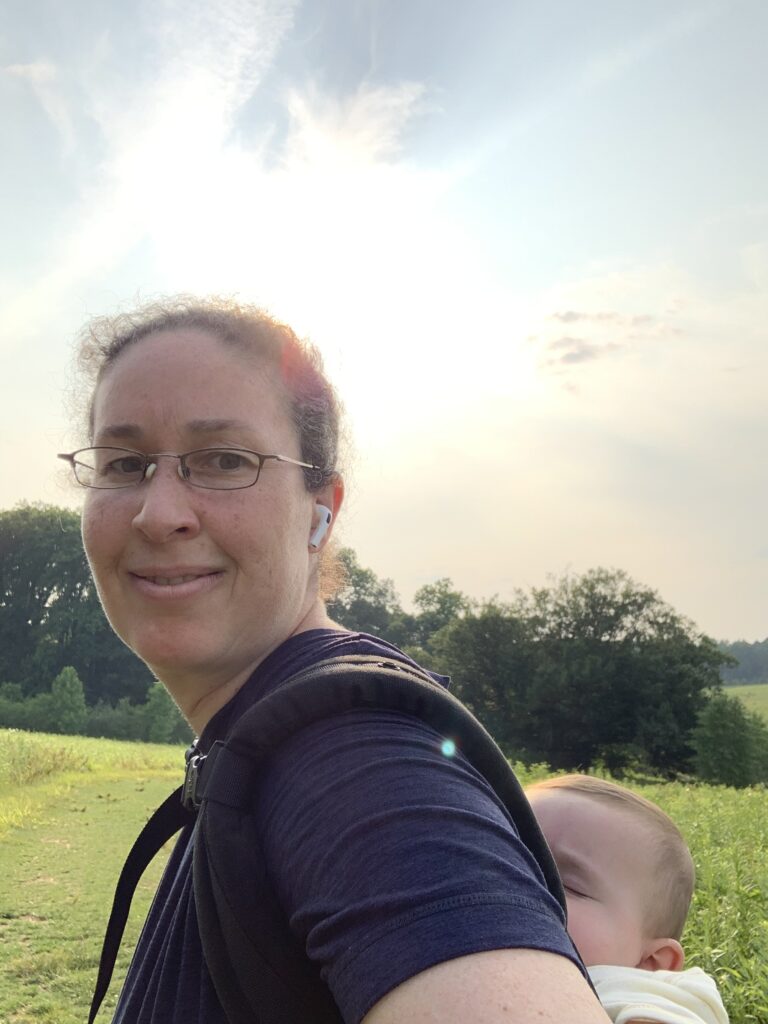
Aravinda Ananda (she/they) is a social ecologist whose life’s work is to support a Living rEvolution – a global movement of healing and transforming human relationships with life on Earth to be mutually enhancing. She has thirteen years of experience facilitating Work That Reconnects and other modes of experiential learning, all of which help integrate our intelligences and ignite our love and passion for healing the human-earth relationship. Since 2017 Aravinda has been one of the lead convenors of the Anti-Oppression Resource Group, a group of WTR facilitators supporting a collective liberation deepening in the Work That Reconnects. She is currently working on a book that updates the Work That Reconnects with a deeper collective liberation approach, and has also developed an anti-oppression foundations curriculum for WTR facilitators. She has a particular interest in supporting groups to build regenerative and transformative beloved communities. Each day she feels honored to increasingly live the rEvolution in her own life and support others to do the same.
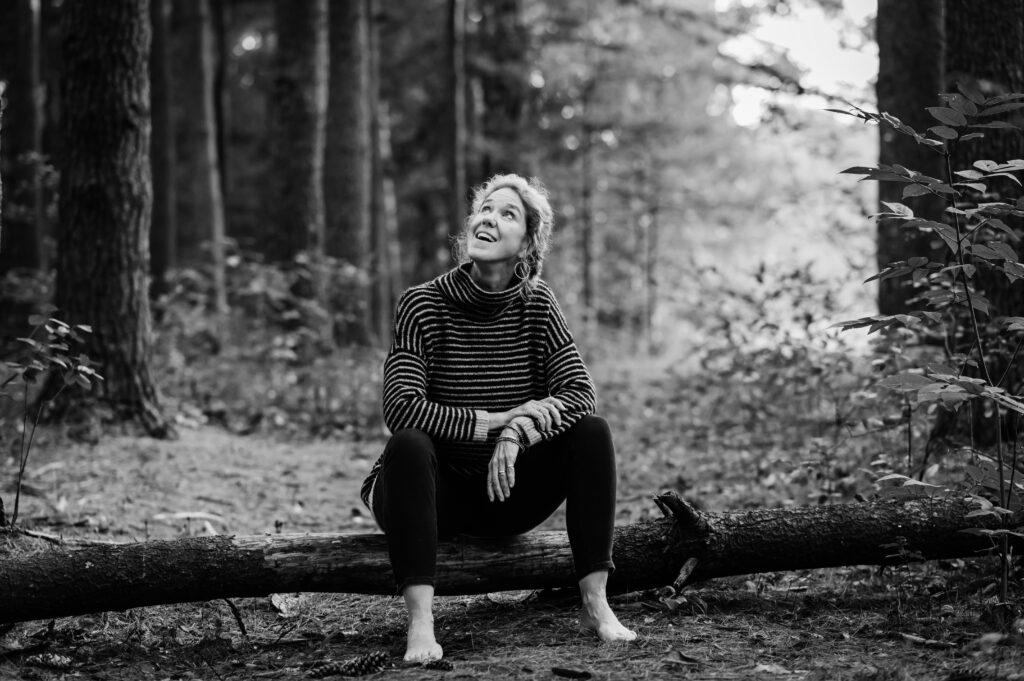
Markie Babbott is a psychologist in western Massachusetts whose work has evolved over her 30 years of practice. She integrates psychodynamic, feminist, and queer theory as well as neuroscience and trauma-informed approaches. Following her interests in mindfulness, creativity, Buddhism, and nature-based ritual, she pursued a master’s degree in Ecopsychology from Naropa University through the Transpersonal Psychology Department (2011). She has been fortunate to study with Joanna Macy many times since 2007 and is grateful to have been a part of the ELC programs from the beginning. In addition to spending time with her two adult children and fabulous four-leggeds, she loves poetry, tending her plot in the local community garden and hiking up (and down!) mountains.
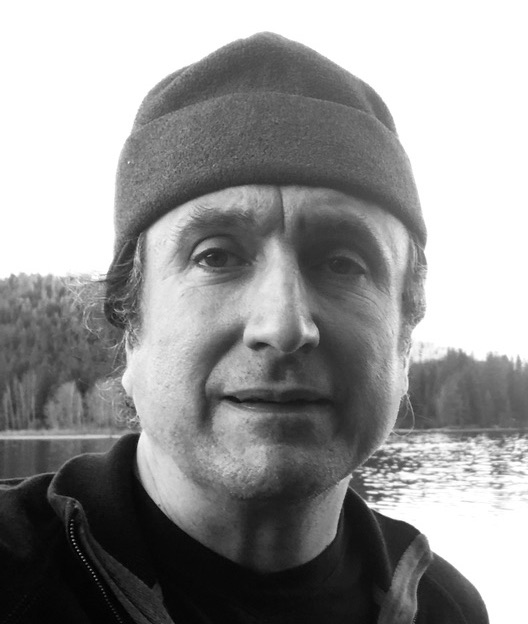
Joseph Rotella is a musician, small business owner, activist, and lover of life. As a small business owner he has used this position in society to advocate for a better world. He has been vocal on various social justice and environmental issues and has had letters to the editor published, spoken on the radio, and testified at the MA state house. He has studied with Joanna Macy numerous times, is a member of the Interhelp Council and has been facilitating the Work that Reconnects since 2011. Over the last few years, he has delved into the study of how power, privilege and oppression show up in many systems of society, even well-intentioned progressive ones. He lives in Watertown, MA with his partner and child and enjoys making kombucha, keeping bees and growing and preserving vegetables.
Assistant Facilitator: For the last five cohorts, the lead facilitation team has been joined by a member of a previous cohort in a special bridging and support role.
What some alumni have said about the program:
“The Earth Leadership Cohort was a totally transformative experience for me. On the first weekend, I arrived burnt out from climate change organizing, barely able to hold myself together emotionally. After the first weekend, I already felt a bit lighter, a little but more able to deal with the deep pain I had been feeling for myself and the state of the world. By the end of the third weekend, I was fully recovered and newly excited and refreshed to not only continue my work, but to incorporate the Work That Reconnects into the future of whatever I do. If you are an activist, organizer, or anyone who feels pain for being in the world that we live in, I cannot recommend this program enough. You will leave not only feeling more able to emotionally and practically step into a place of peace while creating change, but you will also have an incredible new community of fellow change makers.” – Sophie, ELC I
“After 6 years of work as an environmental educator, the Work That Reconnects gave me a transformative and deeply needed shift. It helped me understand myself not as a single individual fighting a win/lose battle, but as an aspect of Life’s natural inclination to heal itself. The ELC facilitators are wise, skillful, loving, and humble. The fellow participants are inspirational. What happens when we connect with others over our shared love of life on this planet is nothing short of magical. We’ve created a space where we can breathe, dance, cry, give thanks, rage, sing, and gaze in wonder. The community we formed in ELC is still going strong, and growing, long after the program itself ended. We are in this for the long haul, and the Work That Reconnects is a deep piece of what can sustain us along the way.” – Daniel, ELC II
“Earth Leadership Cohort gave me a spiritual, communal, and practical foundation for weaving profound transformation into my organizing work. There is great empowerment in naming and claiming the full range of emotions we feel around the state of the world. Start here.” – Adin, ELC III
“Through ELC 4, I gained the most supportive community and friends, and a better understanding of how I can show up with intention and presence. I also learned how to facilitate that when building community, as well as a more nuanced approach to change. This has had a profound impact both in my everyday life and the activist movements I’ve been part of.” – Annabelle, ELC IV
Several members of ELC V compiled this reflective piece about their experience.
